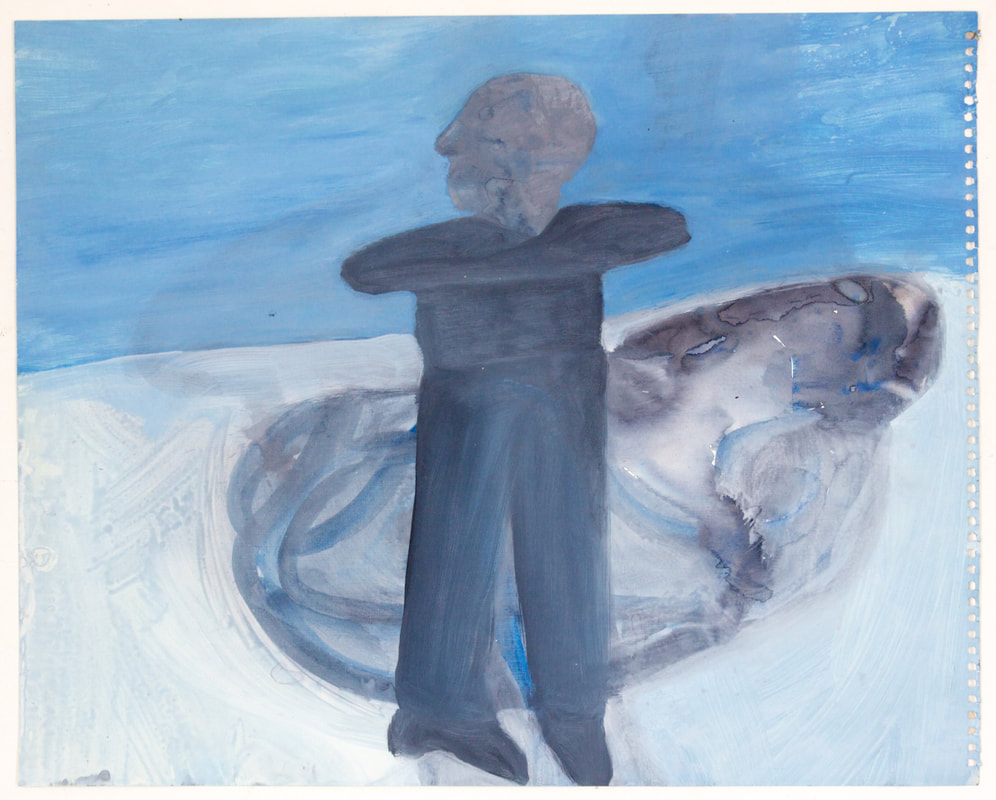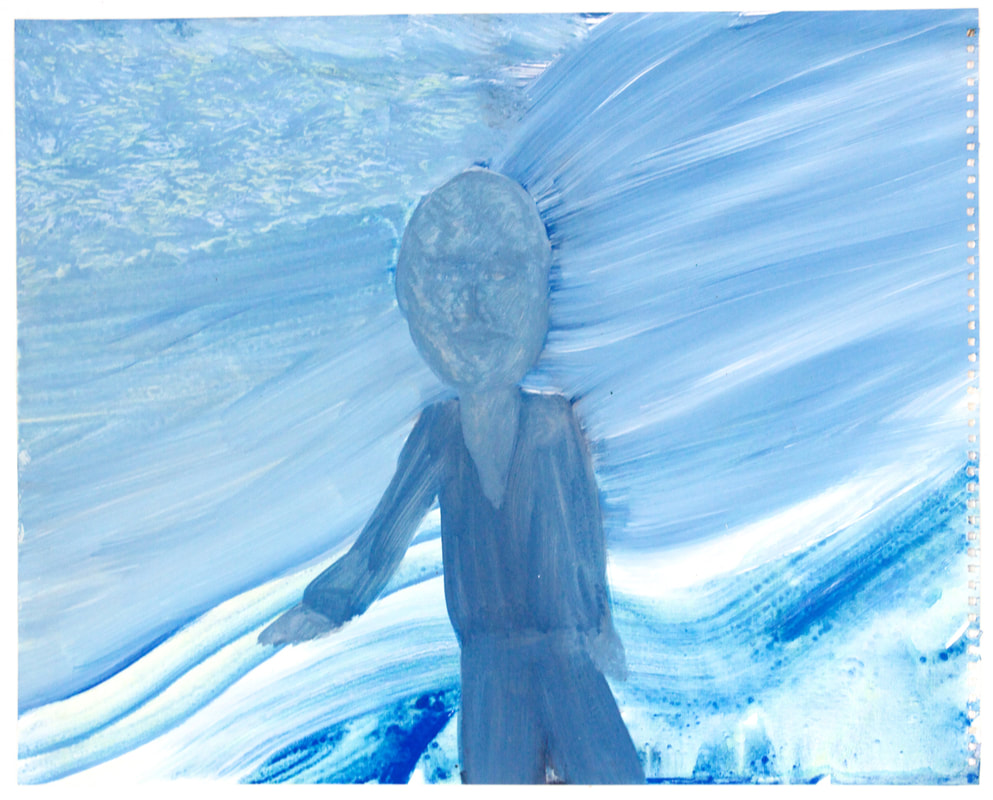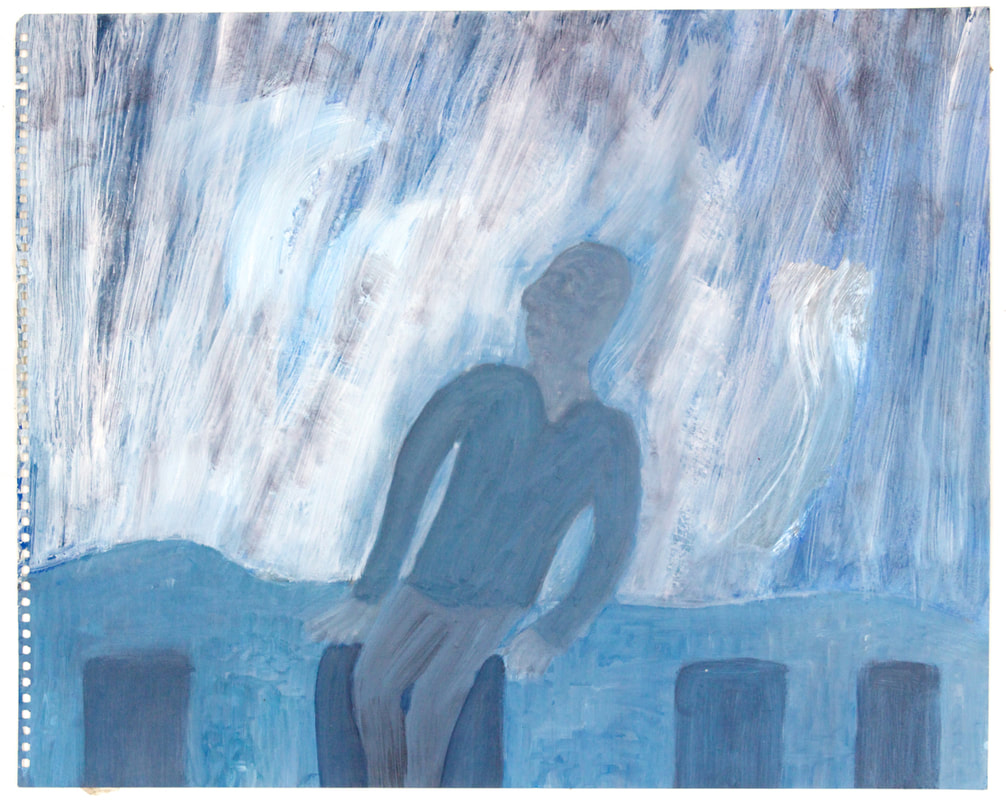|
In A Lonely Place: once, twice, three times. Acrylics, 16x20 inch, 2000 The Lusty Men (1952) Directed by Nicholas Ray. Starring: Susan Hayward, Robert Mitchum, Arthur Kennedy. Warning - plot spoilers! The extensive cuts made to The Lusty Men indicate that RKO studio was dissatisfied with the film. When premiered in England it was seen as a very American subject matter and because it didn’t do well in the U.S. there was a possibility for further cuts. The film is also not firmly anchored to any storyline. It is more wandering and discursive in tone. The sections that include the character Booker Davis, played by Arthur Hunnicutt, were cut for the British audience; these scenes are there for the ideology of the rodeo world being portrayed and as an exploration of character and not for the plot. The film is almost anthropological in terms of locale and character with no real narrative. Only one film critic, Manny Farber, registered any of its qualities. The Lusty Men has subsequently emerged as one of the highest in Nicholas Ray’s oeuvre. It is a modest film that looks ordinary at first glance but has more unusual qualities in many respects. The Lusty Men was made under ordinary circumstances but is not a streamlined, efficient production. It was the producer’s idea to film the rodeo and to ensure the availability of film star, Susan Hayward who gets the top billing. It was conceived of as a Susan Hayward movie who was only available for twelve weeks of filming and this was not during the rodeo season. The film went into production with no script and this was a common feature for Ray’s films. The whole film was made in the studio with the rodeo shots filmed by second unit associates. The film script was improvised after the opening setting. At a late stage of filming, it was decided that the film should end on Robert Mitchum’s death. Everything in the film prepares you for the bust up between Robert Mitchum (playing Jeff McCloud) and Arthur Kennedy (Wes Merritt) and the resultant death and “happy ending”. This fits into the norm for Hollywood films but because Mitchum's character is almost suicidal the resolution is not a problem. Ray reckoned the decision to kill off Mitch lost the film a couple of million at the box office. The story used in the film is a standard success story. This is a regular formulae in film and television and also in stories about sports and entertainment. A young man of talent is trained by an old timer. The young man goes on to achieve success but loses his roots and becomes arrogant. This arrogance leads to humiliation. The resolution involves him undergoing a change of behaviour. But the Lusty Men does not tell this story. Instead of having the rising star as the central figure, Ray focuses on the has-been side kick (Mitchum) and his emotions. The rags to riches story yields another story. It is about Mitch watching another guy have the success he once enjoyed. It has an elegiac quality. Robert Mitchum and Kirk Douglas make for interesting comparisons. They invariably play characters who are going to be defeated. Douglas has a spectacular downfall while Mitchum’s characters usually register dejection and are mournful. Mitchum is often the fall guy in film noir. In The Lusty Men, his Jeff McCloud character is a wistful country boy of limited intelligence. The role is not a huge departure. But what is unusual is one element in the plot; the story of the hero who consciously wishes the destruction of his best friend’s marriage. This is never seen in 1940’s films where a strict Hays Code and respect for marriage is observed. (Ray said to V.F. Perkins that it was just so natural and normal in the film, how could the censors object. You can get away with things by sheer modesty.) The originality of the film lies in the presentation of the character of Louise (Susan Hayward). This is one of the most interesting portrayals of a woman in Ray’s films and is unusual. The romanticism and the sentimentality in the film is attached to the macho world of the male characters. The film is acute about the pain of a macho rodeo life to both men and women. Hayward as Louise Merritt is a calculating woman. She is clear sighted whereas the men are romantically deluded. She is realistic about what to get out of life and with whom. Louise is not prepared to give up her life in the face of the male vanity being displayed in the rodeo world. She is a woman controlling her emotions to get material aims. A female character who displays this in a Hollywood film is usually presented as a schemer or villain; one thinks of Barbara Stanwyck. These are not objectives that are stereotypically ‘womanly.” She never talks about children or family. She doesn’t want to work in the “tamale joint.” This is a fresh interpretation of a female character. Another major aspect of the film is showing codes of masculinity which are presented almost as a theatrical show. The wildest show on earth is not the rodeo but masculinity. The film is successful in making rodeo work not as a lifestyle but as a resonant metaphor which harmonises the presentation of character. The rodeo is about capture and asserting yourself on the past. There is a constant repetition of imagery in the film. At the very ending, after Mitch’s death, a new man enters the rodeo world and there is uplifting music as the film ends for the umpteenth time. The characters are looking for “something they thought lost.” This is not conveyed in the reality of farming where arthritis and the hard labour of tractors are the norm. These have nothing to do with bronc or bull riding. As Wes McCloud becomes more involved in the rodeo, it is not jeans, but the leather rhinestone image that appeals to him. More and more, it is the Roy Rodgers cowboy singing image and not someone dressed for work. The song on the flag. “Old Glory”, and Mitch’s return to rodeo is an attempt to show his past glory. It is an ironic, repetitive, dehumanised rodeo. Ray expressed aggravation that the cruelty involved to get animals wild could not be shown in the film. Within the structure of the film, there is a dividedness which is common to Ray’s films. Here it is between the nomadic lifestyle and one of stability. In They Live By Life (Ray’s 1948 directorial debut) this is evidenced in the lovers on the run and Bowie wanting money to hire a lawyer to prove he is innocent of murder. In The Lusty Men it is about initially wanting to get money to buy a ranch. But Wes is seduced by the glamour and success and instead he buys a caravan which is the perfect 1950s symbol of nomadic lifestyle. In one sequence, Louise is shown sleeping and the camera tracks back to reveal her seated in a car. This is an image of her floating down a street. This theme is strongly registered in the character of Jeff (Mitchum). He is the centre point of this divided world, caught between the nomadic and settling down. This is best illustrated when he first returns to his old home ranch and rediscovers an illusionary security. The Lusty Men is one of the best triangle movies. It is all done modestly and treats this theme sensitively. The film refuses to makes its denouement tragic. The pain it is about is too ordinary for tragedy. The frustrated lives the characters lead are ordinary and we are never tempted to believe that Louise has spontaneous love for Jeff that is going to blossom. She is aware that what Jeff offers as a rival to her husband - stability, security and an unspectacular life - is never going to materialise. The relationship between Jeff, Louise and Wes is unstable. Both Jeff and Louise stand in a parental role vis-a-vis Wes. Louise is a mother figure as well as a wife: taking his boots off; the way Wes sits on the draining board wiping up the dishes. “He ain’t two years old and I ain’t his mother.” Jeff enters as a paternal role training the younger Wes. But when Wes is drunk in one scene, he comes up and pushes himself on Jeff, who then punches him down. They are almost forced into the role of a couple because of Wes’s character traits. Then Jeff has to live with Wes as an adolescent. When Wes discards his advice, Jeff is left alone. One character always feels outside this triangular set up that is reshifting in terms of dramatic relationships. There are a range of other characters who offer models for what the rodeo way of life offers. For Louise it is Grace: “Rodeo will make you an old woman before your time.” For Wes, it is Jeff and Buster Burgess, the latter offering gambling and drinking. Also Booker who is senile, almost mentally incapable of keeping up with the costs and demands of life. None however offer a model of success. Jeff has had success and learnt things. But the movie is consonant with other Ray movies in showing Jeff as simultaneously wise and informed about the ways of the rodeo, with a homespun philosophy where you “eat a little dirt if you have to,” while also substituting guts for good judgement. When it comes to the crunch, he is incapable of good judgement. What he needs and most feels, puts him on the path to catastrophe. Is it logical that his comeback is both a success and a death accident? But this goes with the modesty and unspectacular themes of the film. Jeff (Mitchum) is not a has-been and a wreck. He is not old enough to be a wreck. The death of Jeff is the film’s final form of disaster. Masculinity means you have to find out if you can still do it. You only find this out when you die. This is what the film says about competitive virility. The image of Jeff and his fate as an action image is one of eloquence, poetry. The film puzzles around images of mastery and control. The pride he feels is offered at the beginning of the film. Jeff is standing above the bull in the pen and the shot is composed as a stable frame. Thirty seconds later, the sequence of shots are wild and subjective. The hand-held camera is almost indecipherable. The stability and claim to control is undermined by Jeff’s fall. As an action image this is morally and philosophically pertinent to the themes of the film. 26/02/87 Lecture delivered by V. F. Perkins, University of Warwick, Film and Literature, Movies and Methods : Forms of Analysis
0 Comments
|
Categories
All
Archives
May 2024
|




 RSS Feed
RSS Feed
